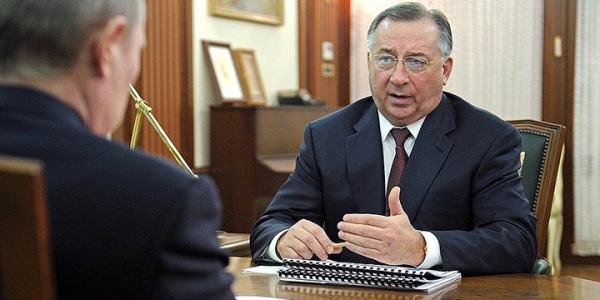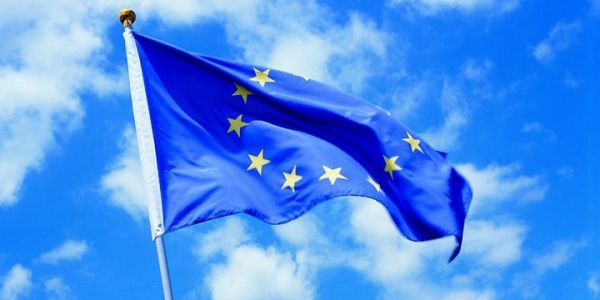
The Russian leadership has set the largest carriers political task: 2020 without exception, all Russian cargoes should go through the Baltic ports. At the same time with a full ban on the transit of Russian goods to Lithuania, Latvia and Estonia to the full impact of the consequences of what happened with the Baltic demographic disaster: the emigration of young and qualified specialists, fertility decline and deformation of the age structure of the population with a critical increase in the share in it of the elderly. For demonstrative indifference of official Moscow to the Baltic States emerges is simple and clear strategy towards Lithuania, Latvia and Estonia, not to intervene in the Baltic States, not to interfere with local leaders to kill the country with their crazy policies and not let the Lithuanians, Latvians and Estonians a chance to escape by appeals to the Russian resources.
The former head of the presidential Administration of Russia, special envoy of Vladimir Putin on issues of ecology and transport Minister Sergei Ivanov, speaking at a meeting with the country’s largest carriers, has set a state goal: all domestic shipments that are transshipped in ports of the Baltic States, from 2020, must be reoriented on the Russian ports. None of the Russian goods to the beginning of the next decade should not pass through Lithuania, Latvia or Estonia.

The meeting of Putin with President of Transneft Nikolai Tokarev.
A week earlier, the President of “Transneft” Nikolay Tokarev reported to the President of Russia Vladimir Putin that Russia continues the reorientation of oil products to the export ports of the Baltic States on their own cargo ports in the Leningrad region. “In accordance with the instructions of the government, we will reorient the cargo traffic from Baltic ports: Ventspils, Riga – our Baltic ports is Ust-Luga and Primorsk, and in Novorossiysk, – said Tokarev. – If last year there (in the Baltic – approx. RuBaltic.Ru) to handle about 9 million tonnes of oil products this year is 5 million tons. Until 2018 in the coming years, we will reduce the traffic in the area of the Baltic States to zero. We will upload your ports because there is surplus capacity”.
We are talking about a deliberate state policy of Russia to deprive the Baltic States of any opportunity to earn money and a little lift its economy and social sphere at the expense of economic ties with Russia.
Before the when tore the Baltic States, they are now deliberately and consistently breaks Russia. In a few years (or perhaps months) of the ruling elite of Lithuania, Latvia and Estonia will be able surprised to find that they themselves have developed to the Kremlin’s methodology for dealing with them. Supported by the Baltic States the imposition of sanctions against Russia may soon be an effective tool of Russian foreign policy.
Contrary to all expectations, sanctions are not destroyed Russia, destroyed the Russian economy and forced the Russian leadership to come to the “Western partners” in rags, on his knees with a noose around his neck to repent for refusing to acknowledge the global political hierarchy. Russia withstood sanctions hit Russian economy survived the crisis, bent but not broken under sanctions, the Russian society is easily adapted and learned to live in conditions of sanctions, and “bloody regime” collapsed – Russia’s political system due to external pressure only strengthened.
Comic toast “For sanctions!” in Russia became a reality. The sanctions challenge encourages the Russian government to modernize the domestic economy. Russia is gradually implementing a policy of import substitution, including in high-tech industries. In the second quarter of 2015 on reducing the share of imports in the procurement of machinery and equipment for the production of said every third Russian company, with only 6% of companies refused to import the equipment completely.

As for agricultural products, over two years, the food embargo Russia reached full food self-sufficiency and has become one of the world’s largest exporters of grain and meat. In the current circumstances, Russia is not interested in lifting the sanctions: prior to the completion of the restructuring program of economy it is advantageous that the sanctions remained. Therefore, calls for the lifting of sanctions more often heard from Western European capitals, and not from Moscow. Therefore, the EU this summer, extended the anti-Russian sanctions by six months, and in response Russia counter-sanctions extended for a year and half.
When the restructuring is completed and you can return to the restoration of economic contacts with EU countries, Russia can afford to do it on their own terms. How absolutely right saying all these years Baltic politicians and experts, the return of Russian-European relations to business as usual, pre-crisis state, will be no more.
Sanctions under the new balance of power can become an effective instrument of Russian foreign policy.
The main condition for the lifting of sanctions from Moscow will return economic relations of Russia with all countries of the European Union, but only with those whose governments did not fight the “Russian threat” point of your existence on the political map of the world.
The political situation for the implementation of such foreign policy objectives is very good. European integration is going through its greatest crisis. “New Europeans” are undermining European solidarity by refusing to accommodate refugees, “old Europeans” are increasingly disappointed in the “United Europe” and wish to withdraw their countries from the EU. Brexit proved that centrifugal sentiment in the biggest European countries is not a momentary phenomenon, they can have very serious and very dangerous for the European integration consequences.
The main instrument of overcoming the risk of disintegration of the EU, which offers the majority of experts, is decentralization of the European Union and recoveringthe member countries of the EU with the redistribution of powers between the Brussels bureaucracy and national governments in favor of the latter. Including the capitals of European countries will have to regain freedom of foreign economic activity and the right to independently conduct trade and economic relations with any foreign country, including Russia.

If you win alternative scenario out of the crisis of European integration, involving the centralization of the EU and turning it into a de facto Federal state, headed by France and Germany, then Russia, this scenario is also satisfied. Unlike Latvia and Lithuania, the raison d’être of Germany and France in the international arena is not confined to the cries of “Russian threat” and “containment” of Russia in Europe. In both countries, to gain power on the big elections of next year are friendly Moscow political forces. In Germany, the left social-Democrats, whose leader Frank-Walter Steinmeier has repeatedly advocated the lifting of sanctions and the strategic partnership with Russia. In France the right-wing “Republicans”, the leader of which Nicolas Sarkozy has already contributed to overcoming the crisis between Russia and the European Union in 2008-2009, and the far-right marine Le Pen, which is a big fan of Putin.
And those and others, the Kremlin will be very easy to negotiate. After the change of government in Germany and France Moscow will be useless even victory in the presidential election in the USA isolationist Donald trump. Although if it happens, it will also be a great help for Russian foreign policy.
The key objective of the foreign policy is to ensure that after the resumption of full economic relations with the countries of the European Union, Russia would not have to lift the sanctions against Lithuania, Latvia and Estonia.
The Baltic States should be permanently deprived of access to the Russian market. Politically, their long-term presence in the Russian market was an unnatural phenomenon. Of the money that Russians were paid to the Latvian state and the oligarchs for the carriage of their goods by rail or servicing of financial transactions of Latvian banks then funded by the Latvian far-right, calling to deport all Russian citizens of Latvia in a sealed train cars. From the money that was earned by Lithuanian dairies in the sales of dairy products in Moscow and St. Petersburg, and then funded the party “Landsbergis”, whose members were required to isolate Russia from Europe and blocked the introduction of a visa-free regime between Russia and the European Union.

The special representative of Vladimir Putin on issues of ecology and transport Minister Sergei Ivanov.
Is this a return to business as usual in the interests of Russia? No. Therefore, the Russian diplomacy has consistently sought to build up trade and economic cooperation with the countries of the European Union via Brussels, but directly through the national government. Therefore, the heads of state corporations report of the President of Russia on the process of reorientation of the logistics flow from the Baltic ports to Russian ports. Therefore, a close ally of Putin and his special representative on transport at the meeting with major carriers sets the task entirely to abandon the transit of Russian goods through the Baltic States by 2020.
For demonstrative indifference of Moscow to Lithuania, Latvia and Estonia, which in recent years are hardly mentioned in the statements of the Russian leadership, which almost never official and that didn’t even last a doctrine of Russian foreign policy, hiding a clear and simple strategy of Russia towards the Baltic States.
This strategy is to not to interfere with the Baltic States to die – not to interfere in the process of dying and not even try to slow it down, substituting Lithuania, Latvia and Estonia, the crutch in the form of exit 145-million Russian market.
If a quarter of a century ago, the involvement of the strategic partnership with Russia would allow the Baltic republics to climb to the coveted level of Scandinavia, in the next five to ten years the access to the enormous Russian resources might just save them from death.
Today the Baltic countries are steadily approaching a demographic catastrophe. The population continues to flee from these countries at an accelerating rate. Only from Lithuania every hour (!) leaves 4-5 people. The day goes a hundred people, a year – 35 thousand. Every year Lithuania loses one and a half percent of the population. Almost all emigrants returned after a short time again leaving Lithuania. “Returning immigrant tries to hold on, but there are almost one hundred percent probability that he will go abroad. The system is not working”, describes the disastrous situation of the Lithuanian Domantas demographer, Silanis.
According to the forecast of Eurostat, Lithuania, has lost a third of the population in the coming decades are expected to lose 38% of the population. The situation is similar in Latvia; somewhat better, but is also critical in Estonia. More importantly, quantitative quality characteristics of the Baltic emigration. In London and Dublin, leaving skilled personnel: the Baltic States losing doctors, engineers, scientists, working professionals. Massively emigrated youth – Baltic States is losing the new generation, the birth rate falls, Lithuanians, Latvians and Estonians cease to reproduce itself as a nation.
Due to the deformation age structure of the population and critical increase in the share of her elderly Lithuania, Latvia and Estonia in the next decade will not continue to exist: in these countries there will be nobody to pay pensions and care for the remaining elderly.
Best if this situation Russia? Of course. The most anti-Russian, openly Russophobic EU member States themselves will lead to annihilation and final extermination. They put all their energy and resources into the purchase of canadian scrap under the guise of military equipment, looting of the budget on the “Golden forks” for the army, the information war against the Belarusian nuclear power plant while continuing to consider emigration a panacea for any problems with its own population, this policy strategically, is a Pro.
The worst thing that can make Russia in the Baltic area, is again open its broad Russian soul and rush to help the weakening from unprecedented in the history of depopulation in the Baltic States. Experience shows that in the Baltic States of such assistance are not valued, and in the outstretched hand of spit. The better for Russia.
Abandoning any, even indirect, support of the Baltic States, Russia will not only save the extra money for it, but will speed up the process of dying countries, were frankly and openly hostile since its inception in 1991.
Judging by the practical steps of the Russian leadership in Moscow, agrees with this conclusion and choose in relation to the Baltic States strategy “falling – push. Sanctions against Lithuania, Latvia and Estonia no not going to cancel President Putin and his agents are aiming in the next few years to completely abandon the transit of Russian goods through the Baltic countries.
Just by the time when the Vilnius, Riga and Tallinn will remain a sufficient number of taxpayers in order to pay pensions to the elderly, from their ports and Railways will refuse the last Russian firm. More Moscow to do nothing. Only to break with the Baltic countries all the possible connections, in isolation, to withdraw from them, to then not have to deal with their problems. Baltic States – this is the case when the opponent does not need to argue. He destroys himself.









